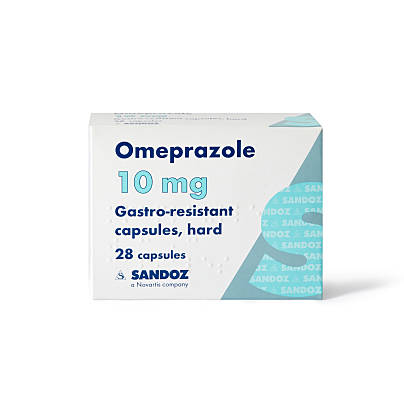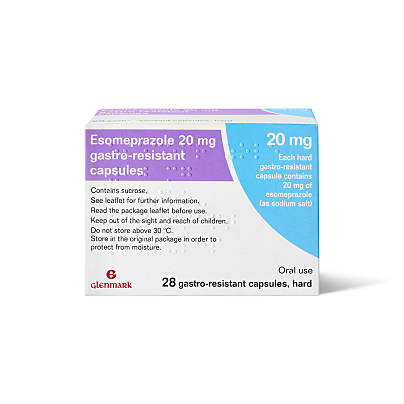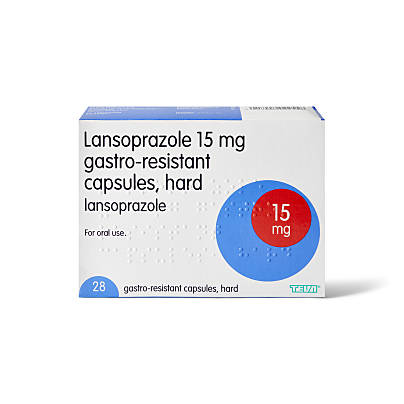Acid Reflux Treatment
Acid reflux is a common symptom of indigestion, where stomach acid travels towards your throat. Acid reflux treatments work quickly and are extremely effective in preventing and treating its symptoms.
Prices from £14.00
Simply fill in a brief questionnaire. One of our doctors will review your order and prescribe a suitable treatment. How to Order
Acid reflux is a common condition caused by stomach acid travelling up towards the throat that can lead to uncomfortable symptoms like bloating, nausea and chest pain. Acid reflux treatments work to prevent acid reflux from happening and can also stop acid reflux once it’s started. If you’re struggling with acid reflux, we can provide treatments that can help.
There are a range of over-the-counter and prescription medications that treat acid reflux and its symptoms. These include proton pump inhibitors (PPIs), which work by reducing how much stomach acid you produce. PPIs include medicines like esomeprazole, omeprazole, pantoprazole and lansoprazole.
In stock. Prices from £14.00
In stock. Prices from £15.00
In stock. Prices from £15.00

No results found.
Please check your spelling or try another treatment name.




About acid reflux treatment
-
-
Acid reflux is a symptom of indigestion that occurs when stomach acid travels up towards the throat. This can lead to a burning feeling in your chest, commonly known as heartburn. It can also cause symptoms like a hoarse voice or bad breath, hiccups, a cough, or a feeling of being bloated or sick.
Certain medicines, foods and drinks can worsen the condition and avoiding them can help. Pregnancy, smoking, stress, and anxiety can also increase the risk of acid reflux and heartburn.
When you have a chronic or severe form of acid reflux, it is known as gastroesophageal reflux disease (GERD or GORD).
-
-
The main symptoms of acid reflux include heartburn (a burning sensation in the middle of your chest) and an unpleasant sour taste in your mouth caused by stomach acid. Acid reflux symptoms are often worse when lying down and bending over, and you may feel worse after eating. Other symptoms of acid reflux include:
- a hoarse voice
- bad breath
- bloating and nausea
- recurring hiccups or cough
You should also see your GP if:
- you are over 55 years old and have new acid reflux symptoms, and have not seen a doctor or had investigations for this
- you are already using acid reflux treatments and your symptoms are not getting better, or they get worse
- women (especially those over 50) should see a doctor if they experience other symptoms which might be related to ovarian diseases, such as pelvic pain, needing to pass urine more frequently or more urgently, abnormal vaginal bleeding or shortness of breath.
Other symptoms alongside acid reflux can indicate a more serious condition, so you should speak to your doctor urgently if you have any of the following symptoms:
- unintentional weight loss
- vomiting with visible blood or that is brown/looks like grounds of coffee
- sticky black stools that look like tar
- a lump or mass in the abdomen
- difficulty swallowing
- breathlessness
- chest pain
- jaundice (yellowing of the skin and eyes)
How long does heartburn last?
Heartburn can last for a few minutes to around 2 hours or more, depending on the cause or trigger. Chronic and severe heartburn is likely to last for longer periods than heartburn that’s been triggered by eating acidic or spicy food, as this usually goes away after the food has been digested.
Acid reflux symptoms can return several hours after first appearing, usually after lying down or bending over. If you’re experiencing heartburn more than twice a week for more than a few weeks, then you should speak to your doctor.
-
-
The terms acid reflux and heartburn are often used interchangeably, but they do mean different things. Acid reflux is the condition where acid or the contents of your stomach flow back into the oesophagus. Whereas the burning feeling due to acid reflux is what we call heartburn. Due to this, medication for acid reflux usually treats heartburn as it’s a symptom of the condition.
-
-
- Lifestyle changes. Losing weight, quitting smoking, and reducing/avoiding certain foods and alcohol can drastically reduce symptoms of acid reflux and heartburn. This can take time and requires commitment, but there are few downsides to making these changes.
- Home remedies. There are home remedies you can try to treat acid reflux and heartburn. These natural alternatives to medication include chamomile, slippery elm, ginger root, and marshmallow root. While these can relieve symptoms of excessive stomach acid for some people, there is little scientific evidence to support how well they work.
- Antacids. Antacids can be used to relieve mild acid reflux and heartburn symptoms. Ideally, these should be taken with food or shortly after eating, as this is when you would most likely experience indigestion or heartburn.
- Proton pump inhibitors (PPIs) and H2 blockers. These are medications that are taken to reduce the production of stomach acid. They are usually extremely effective ways to treat acid reflux. While some can be purchased over the counter, you will need a prescription for higher doses or certain treatments.
- Surgery. In extreme cases, you may have to undergo surgery to treat acid reflux. This is usually very successful, and most people don’t require medications afterwards. The most common reason for surgery includes constant heartburn that doesn’t subside with medicine and lifestyle changes.
-
-
The best ways to prevent acid reflux are to:
- cut down on spicy foods and fatty foods that can cause or make heartburn worse.
- avoid caffeine and alcohol as this can increase the production of stomach acid, which can lead to acid reflux
- quit smoking. Smoking increases the amount of stomach acid you produce, which makes acid reflux more likely
- lose weight. Excess belly weight causes more pressure on the stomach, which makes acid reflux more likely to occur. By losing weight, you can prevent this from happening.
- de-stress. Emotional stress can actually increase how much stomach acid you produce, which can increase how likely you are to experience acid reflux.
-
-
Acid reflux medications work by reducing how much stomach acid your body produces. These medications are called PPIs and H2 blockers, and while they work very similarly by binding to receptors in your stomach lining to reduce acid production, they can have different effects. For example, H2 blockers work faster than PPIs, but PPIs provide longer-lasting relief, making them the best choice for people who frequently suffer from heartburn. Due to this, the right acid reflux medication for you will depend on the severity of your condition, when it affects you and what your doctor thinks is most suitable to help.
Please note that even if you plan to purchase acid reflux medication over the counter, it’s important to speak to your GP before trying any medication, so they can assess whether it's right for you.
-
-
While most people who take acid reflux medication won’t experience side effects, those that do will often experience different things. If you notice any side effects, they will often be mild at first and will go away when you stop your medication. Common, mild side effects include:
- constipation
- diarrhoea
- headaches
- nausea
- stomach pain
- vomiting
- wind
If these side effects bother you or don’t subside, then you should talk to a pharmacist or doctor. Side effects that are more severe but less common include:
- abnormal skin changes such as a raised rash, redness and blistering, and joint pain. This can be a sign of a rare condition known as subacute cutaneous lupus erythematosus, so if you do get these side effects you should speak to your doctor right away.
- extreme tiredness followed by yellow skin and dark urine. This can be a sign of liver problems and should be addressed by your doctor.
Some people can experience a serious allergic reaction called anaphylaxis, but this is rare. If you experience any serious side effects, then you should call your doctor immediately or head to A&E.
-
-
How do I know I have acid reflux?
You can usually tell you have acid reflux because of how you feel. You will probably experience heartburn and an unpleasant taste in your mouth, which are the main symptoms of the condition. You may also have a hoarse voice, bad breath, bloating, nausea and a cough, or recurring hiccups. If you are getting these symptoms, you should speak to your doctor to rule out any underlying causes and make sure you’re getting appropriate treatment.
Does drinking water help acid reflux?
Drinking water can help with acid reflux as water can balance the pH of a particularly acidic meal, which reduces the risk of acid reflux. Research suggests that drinking mineral water that has high levels of hydrogen carbonate can also help reduce the frequency and severity of acid reflux.
Does drinking milk help acid reflux?
Depending on the type of milk you’re drinking, it can either help with acid reflux or make it worse. This is because fat aggravates acid reflux. So if you’re drinking milk with a high fat content, you may feel initial relief, but you could be making things worse. However, drinking skimmed milk can act as a temporary buffer between any acidic contents in the stomach and the stomach lining to reduce heartburn.
What food aggravates acid reflux?
Common foods to avoid when you have acid reflux include:
- fried food
- fast food
- potato chips, and other processed snacks
- chili powder and pepper (white, black, cayenne)
- fatty meats such as bacon and sausage
- cheese
- spicy foods
- acidic foods, such as citrus fruits
- caffeine
- alcohol
It’s important to remember different foods aggravate acid reflux for different people, and what may trigger it for you may not for someone else.
Can acid reflux go away on its own?
If you have mild acid reflux or heartburn, it can go away on its own. However, most people will require some kind of medication, even if it's an antacid such as Gaviscon. If you have more severe acid reflux or heartburn that just won’t go away, then you should seek treatment to help you manage it.
Why does acid reflux cause burping?
People who experience acid reflux often find themselves burping more due to swallowing more, which is caused by acid reflux. Chronic belching can also be triggered by inflammation of the stomach lining or an infection with the bacterium that causes some stomach ulcers called Helicobacter pylori.
Does acid reflux cause chest pain?
Acid reflux can cause chest pain which is often referred to as heartburn. This is caused by stomach acid working its way up the oesophagus. This is usually a burning sensation felt in the chest, but it can also be felt in the upper abdomen. This sensation usually occurs after food or when bending over or lying down.
What is gastro-oesophageal reflux disease (GORD)?
Gastro-oesophageal reflux disease (GORD) is a more serious form of acid reflux. When the backflow of stomach acid occurs frequently and chronically, it can cause damage to the body over time, leading to GORD. The most common symptom of GORD is heartburn 2 or more times a week.

Babak studied medicine at King’s College London and graduated in 2003, having also gained a bachelor’s degree in Physiology during his time there. He completed his general practice (GP) training in East London, where he worked for a number of years as a partner at a large inner-city GP practice. He completed the Royal College of GPs membership exam in 2007.
Meet our doctorsArticle created: 10 Jan 2023
-
Acid reflux and GERD: The same thing? (2021) Mayo Clinic [accessed 10 November 2022]
-
Antacids (2019) NHS [accessed 10 November 2022]
-
GERD diet: Foods that help with acid reflux (heartburn) (2022) Johns Hopkins Medicine [accessed 10 November 2022]
-
Heartburn and acid reflux (2020) NHS [accessed 10 November 2022]
-
Heartburn: How long can it last and how to find relief (2018) Healthline [accessed 10 November 2022]


GMC: 7074021

GMC: 6149061

GMC: 7085115










